How to Conduct a Massachusetts Business Entity Search
Check out our guide on searching the Massachusetts Secretary of the Commonwealth’s website.

Last Updated: July 9, 2025
The Massachusetts business entity search tool is a valuable resource for anyone who wants to look up information about companies that operate in the commonwealth. Whether you’re a veteran business owner who needs to look up forms you filed on the commonwealth website or a soon-to-be entrepreneur who wants to check availability for their business name, the search is your go-to tool.
But how do you use the search? If you’ve never used a search like this before, it can feel a little overwhelming. In this guide, we’ll walk you through how to use the search. We’ll also walk you through some important Massachusetts entity naming guidelines and what to do after searching a business name.
Let’s get started.
Massachusetts Secretary of the Commonwealth Contact Information
| Address: One Ashburton Place Boston, MA 02108 | Office Hours: Monday-Friday 8:45 am to 5:00 pm |
| Telephone: 617-727-7030 | Website: https://www.sec.state.ma.us/ |
Massachusetts Business Name Guidelines
When you’re starting a business, one of the most important things you’ll do is pick your business name. And like other states, Massachusetts has several rules about naming your business.
First, your name needs to be different from the names of other registered companies in Massachusetts, including both domestic and foreign corporations, limited liability companies (LLCs), limited partnerships, and so on. This is one of the simplest but most important naming standards.
That said, uniqueness isn’t the only naming guideline to adhere to. Here are a few other rules your Massachusetts business name should follow:
- Your business name should include a designator. For example, a corporation needs to include the words “limited,” “corporation,” “incorporated,” “company,” or an abbreviation of those words. Meanwhile, LLCs need to include the words “limited liability company” or “limited company” or the abbreviations “LLC” or “LC” (with or without periods).
- An LLC name may (but doesn’t have to) include the name of a member or manager.
- Your name can’t state or imply that you’re conducting activities that aren’t permitted by law or by your company’s formation documents.
If you’re in a licensed trade or profession, keep in mind that you’ll need to meet any naming rules that your industry has in place, too. If your business name doesn’t meet these requirements, you’ll need to pick a new one.
How to Search by Entity Name
There are several different ways to use the Massachusetts business entity search tool, but the most common one is the entity name search feature. In this section, we’ll focus on how to search for company records by entity name.
Step 1: Choose your search settings
To get started, navigate to the search home page. The “Entity Name” button should be selected by default, but change it if it’s not. The resulting search homepage should look like the image below.
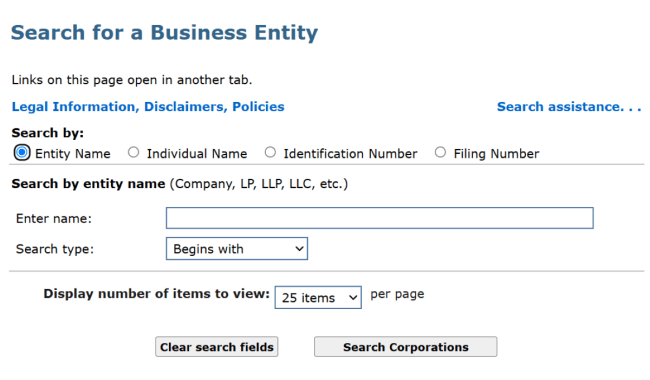
Before you type the desired corporation or LLC name into the “Enter name” search bar, you’ll want to set your search filters in the drop-down menu labeled “Search type.” Here are your options:
- Begins with: This default setting will retrieve the business names that start with the word(s) you searched.
- Exact match: This setting retrieves any business names that are identical to the search terms you type. Note that this search only retrieves results for a name if you type it exactly as it’s on file with the commonwealth, including the designator.
- Full text: This setting retrieves the business names that include each word you search. For example, if you searched “America,” the business tool would retrieve all the results that include “America” anywhere in the business name.
- Soundex: This search retrieves all of the business names that sound like the name you type.
Choose the setting that best matches your search goals, type your name (or partial name) into the search bar and hit “Search Corporations.” Note that, despite the button reading “Search Corporations,” it will still retrieve results for LLCs and other registered business entity types.
Step 2: Review your search results
The entity name search will retrieve a list of all the business names that match your search terms. For example, when we ran a “Begins With” name search of “Smith,” the results page looked like this:
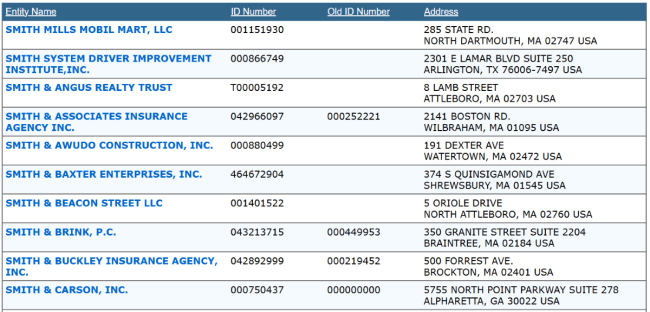
This first results page will show you information about each matching company, including the company name, ID number, old ID number (if applicable), and the address for the company. If you’d like to learn more about a company, click on the company name to review a more detailed business entity summary.
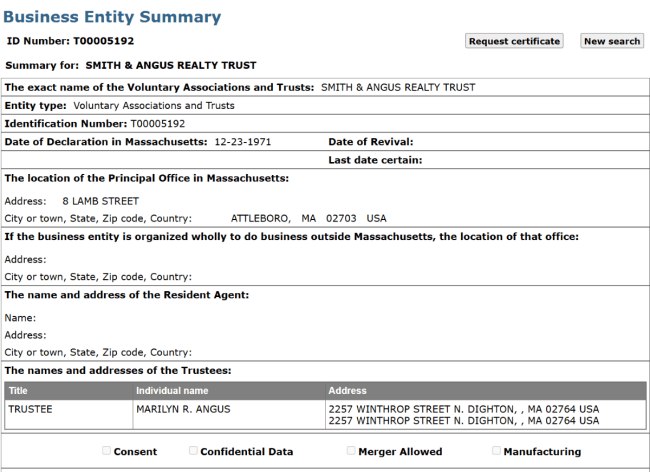
On this page, you can review a lot of information about a company, including its entity type, formation date, principal office location, and names and contact details for the registered agent, officers, members, or other important individuals on file for the company.
At the bottom of this page, you can also view filings submitted to the Corporations Division, such as its annual report, Articles of Organization, and other forms. These documents are all part of the public record, so anyone can view and print these forms. You can also use this page to request a certificate for the business on this page.
How to Check Name Availability
If you’re starting a new Massachusetts LLC or corporation, then you’ll want to check if your official name is available in the commonwealth before you file any paperwork. The Massachusetts business entity search can help you do your due diligence to check if it’s available or not. Technically, the name search isn’t an “official” name availability search tool. But you can get an idea of the current name availability with it.
To start, type your desired name (minus the company designator like “LLC” or “Inc.”) into the name search bar using the “Begins with” filter. If no names begin with your search terms, you won’t see any results. But if there are matches, the tool will pull them up. It’s also helpful to run the same search using the “Soundex” filter. This one will help you locate any names that might sound like your name, even though they’re spelled differently.
Between these two searches, you should have some idea whether your exact name is available or if you need to make some changes to make it distinguishable.
How to Search by Individual Name
Another way you can search the Massachusetts business database is by the name of an individual associated with the entity, such as a director or officer of a corporation, a member or manager of an LLC, or another person. Here’s how.
To start, navigate to the search home page and set the search to “Individual Name.” You should see a page like this:
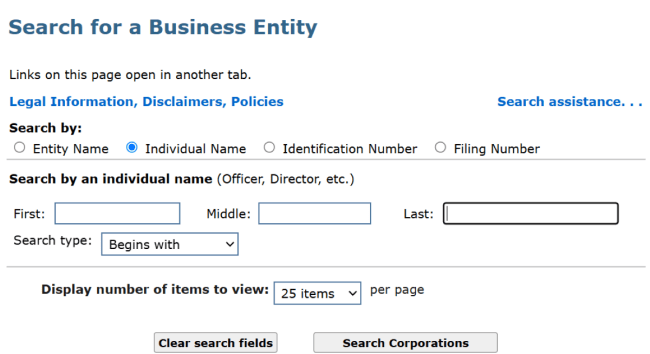
As before, you can set filters or leave it on the default “Begins with” search. After that, you’ll need to type as much of the name as you know for the individual you’re searching for. Then hit “Search Corporations.”
The results page will pop up with any and all matches for your search. For example, when we typed the last name “Smith,” this is what our results page looked like:
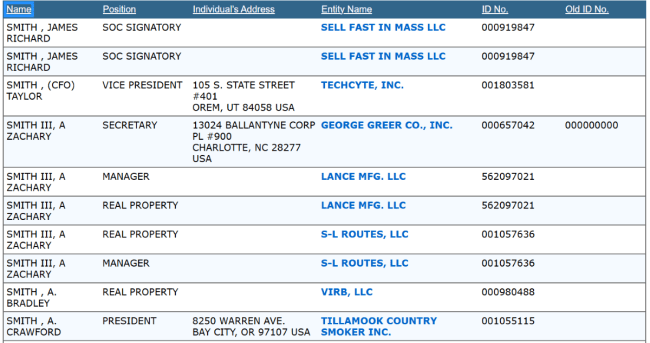
On the left-hand side of the page, you’ll see the name of each individual that matches your search terms and the position they hold. You’ll also see their address if there’s one on file with the commonwealth. Then you’ll see the name of the entity that the individual is affiliated with. Finally, you’ll see the entity’s ID number.
As before, you can click on the company name to review the business entity summary for the company.
How to Search by Identification Number
If you use the search methods we covered above, there’s a decent possibility that the tool might pull up a long list of search results to sort through. But if you want to find a specific business right away, the quickest option is to run an ID number search.
The Secretary of the Commonwealth’s office assigns a unique ID number to each business that registers with Massachusetts. So if you know that number and search by it, you’ll jump straight to that business’s information.
To get started, navigate to the search page and then set the tool to the “Identification number” tab.
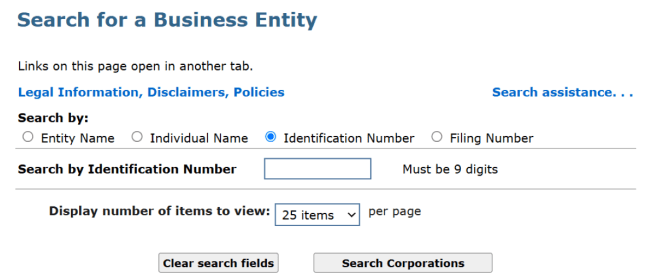
Next, type in the nine-digit ID number into the search bar and hit the “Search Corporations” button. As long as you typed in the number correctly, you’ll be directed to a results page for the existing entity that matches the ID number you searched.
How to Search by Filing Number
The final way you can use the business search page is to search by a filing number. The Secretary of the Commonwealth assigns a unique number to every form that’s filed with the office. And if you search by that number, you’ll be directed to the corresponding form right away (and you’ll also see some information like the name of the company that filed the form and when they filed it).
To run this search, you’ll need to navigate to the search page and set it to “Filing Number.” Then type in the filing number.
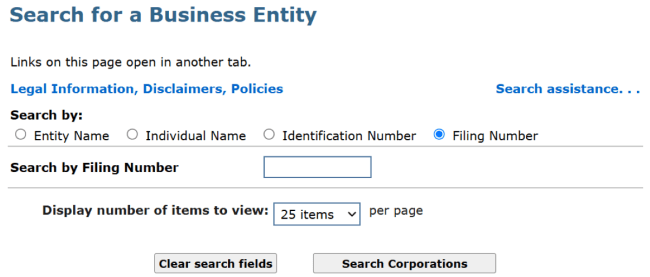
What to Do After Searching Business Names in Massachusetts
After you’ve come up with a perfect name and searched it, you’re probably feeling like you’ve done a lot of legwork. You’d hate for that hard work to go to waste, right? Here are some steps you can take to protect your Massachusetts business name and make the most of it.
Reserve your Massachusetts business name (optional)
If you’ve picked the perfect business name but you’re not quite ready to file your business formation paperwork, Massachusetts allows you to reserve a business name.
You can get a Massachusetts name reservation by filing an Application of Reservation of Name form with the Secretary of the Commonwealth’s Corporations Division. There is currently a $30 filing fee for reserving a name.
After your paperwork is filed and approved, your name reservation will be valid for 60 days. You can also renew the reservation if you need additional time. This step is optional, and you should only pursue it if you’ve picked a name but aren’t ready to file your formation paperwork yet.
Form an LLC or register your business
One of the best ways to protect your business name is to register your business. After you register a business under your chosen name, no one else in Massachusetts will be able to register their own company with the same name.
Registering a Massachusetts business is an important legal process. Learn more about starting a Massachusetts LLC.
Get a domain name that matches
You want your customers to find your business website easily. That means you need a domain name that matches your business name as closely as possible. A matching domain will help your brand maintain consistency both in person and online.
If you’re struggling to come up with a domain name (or the one that matches your name is already taken), try using a domain name generator. A generator can help you come up with a domain that matches your brand image.
Set up your business online
Today, you can’t run a business without a good digital footprint. A good business website is a decent starting point. But don’t stop there; set up social media accounts like a Facebook page, a TikTok profile, and an Instagram account. Make sure your business name is included on each account so your brand is consistent across your online presence.
Last but not least, set up a Google Business Profile for your business (or claim it if it already exists). This profile will help you direct customers to your website or your store location. Plus, it’ll help you respond to customer reviews and build a good brand reputation in the Bay State.
Trademark your business name (optional)
If you want the most robust protections for your business name, you could pursue trademark registration. Trademarks can be registered at the state or federal level (with federal protections being the strongest).
Getting a trademark can be pretty complicated and time-consuming. If you go this route, it’s highly recommended to work with a trademark attorney.
Start an LLC in Your State
When it comes to compliance, costs, and other factors, these are popular states for forming an LLC.
Conduct an Entity Search in Your State
Disclaimer: The content on this page is for information purposes only and does not constitute legal, tax, or accounting advice. For specific questions about any of these topics, seek the counsel of a licensed professional.
Let's Get Started




